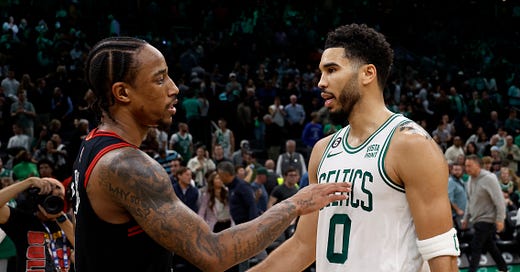The Disrespect!
If the NBA's In-Season Tournament tiebreaker's broken, let's fix it. Here is the solution
The In-Season Tournament (IST) has been a hit. It has brought extra competition to games that already meant something. The players like the extra incentives, and the fans have bought into the spectacle and additional meaning.
But the tourney has also brought a little controversy around one of the tiebreakers: point differential. If teams ended the group-stage games tied in the IST standings, and there was no head-to-head advantage, then point differential across IST games became the tiebreaker.
This was true across Group C in the East where Boston, Orlando, and Brooklyn all ended up at 3-1, the Celtics winning the tiebreaker with a +27 point differential. It was also true for the wildcard entry between New York and Cleveland, with both teams at 3-1 but the Knicks outscoring their opponents by +42 vs. just +29 for Cleveland.
This has incentivized running up the score when the game has already been effectively decided. DeMar DeRozan complained, “I don’t care about no In-Season Tournament points or none of that. Just respect for the game.”
Likewise, Jayson Tatum lamented, “The point differential thing, I’m not the biggest fan of it because there were certain instances, I guess last Friday, where the game is already over and guys are still trying to score.”

With a couple of players complaining, the league is going to listen.
I would complain, too, but I think the players already got someone’s ear.
Let’s get … normal
Complaints should be followed by a solution, so here is how I’d change it.
I would look for when a game is last in “normal time” — in other words, when the game moves to garbage time — and then use point differential at that point.
Lacking a clear line for when garbage time begins, let me propose this graph, which shows the point differential needed for when a game is still considered to have “normal” competitiveness.

With about two minutes left in the game, the point differential that puts the game out of reach is 14 points, for example, based on my research. Throughout much of the third quarter, that point differential is 25 points.
I built this idea years ago, trying to estimate exactly when garbage time began. Of course, it’s hard to know precisely for every situation because it involves getting in coaches’ heads to understand when they feel like they’re safe taking their top guns out.
(There is actually a third stage of the game that is less frequent, which is desperation time, the period when the game is still competitive but one team is desperately fouling in the hopes of staying in the game.)
Change the game
Here is a specific game from the IST where controversy arose: when Boston was beating Chicago and fouling Andre Drummond to maintain or build its margin. The Celtics had a 25-point lead at 6:06 of the third quarter when Tatum hit a 3-point shot to increase their margin to 28 points with 6:02 to go. That 25-point lead was the last time during that game that their actual scoring margin was no bigger than the trigger scoring margin that I propose.
So, under this solution, the scoring margin to use in the tiebreaker is 25 points. The take fouls that the Celtics used in the middle of the fourth quarter — those didn’t help Boston in any way with this approach. So this plan eliminates or reduces the temptation to commit take fouls to run up the score.

This approach incentivizes playing hard up to a point, but not piling on. It would effectively eliminate the needless chucking of shots when the game is already decided, but it would still identify who played well when it mattered.
Fortunately, as proof of concept, if the NBA had applied this method for the teams involved in tiebreakers this year, the same teams would have qualified.
For instance, in East Group C, instead of Boston’s +27 winning the group, its “normed point differential” actually would have increased to +32. Usually, the normed value is smaller if teams are piling on, but the Celtics were the recipient of an opponent pile-on — that being Orlando in the latter stages of the Celtics-Magic game. In that game, the Magic padded an 11-point lead with 1:14 to go all the way up to 17 points when they didn’t need to … which spawned the Tatum complaint.
This method accounts for that on both the Celtics and the Magic sides. Putting a simple hard cap of, say, 20 points on point differential for a single game wouldn’t have worked for this Magic-Celtics game because the Magic piled on in the last two minutes.
For the wildcard, the Knicks +42 point-differential shrinks to +29 when accounting for garbage and normal time. The Cavs’ +29 point-differential drops to +23, so the Knicks still hold the spot.
Respect the game
This is a solid approach for avoiding the problem of “disrespecting the game” late to win a tiebreaker. And the details are somewhat flexible. This algorithm is good, but not perfect. For example, if a team is leading by 5 with the ball and 15 seconds to go, it is still incentivized to score even if the opponent has given up, which would be deemed disrespectful. Accounting for details of who has possession very late in the game could avoid these situations, but that adds complexity, which doesn’t appeal to everyone.
This method does approximately capture how coaches have generally managed the game, even if a coach will seldom spell out when the game was effectively over. In other words, this method is explicit about something that coaches know implicitly — there are margins too big to overcome.
Of course, there are alternatives to this method. Seth Partnow proposed using quarters won as a tiebreaker. This would help, but you can still get late-game disrespectful behavior if a team is leading the game in the fourth quarter but losing that quarter.
A very simple alternative is to count point differential only in the first half of games. This avoids all the disrespect questions late in the game, but is missing half of the game.
As currently designed, the IST is too short to avoid tiebreakers. This is going to happen again.
And maybe disrespecting the game isn’t that big a problem if guys are getting prize money at the end. But there are reasonably simple fixes available that do a better job of dealing with the problem of piling on.





Waited a long time to see the dynamic duo back together again. Congrats Dean and Royce. Excellent stuff as always